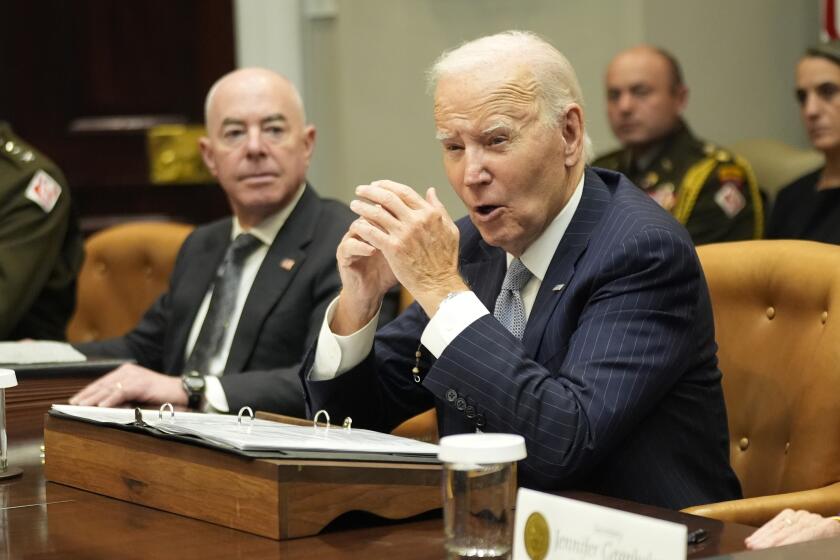Somali Clans Battle Near U.S. Troops
U.S. troops preparing for the withdrawal of U.N. peacekeepers here took cover along Mogadishu’s beaches Sunday as Somali clans broke into open warfare, sending stray fire into American positions, delaying retreat exercises and turning back a U.N. evacuation flight.
“This is the preliminary,” Army Special Forces Staff Sgt. Matt Mutarelli said with a shrug as bullets flew overhead.
From a bunker on a dirty sand berm called Hill 22, Mutarelli commanded a view of the unhappy situation. On the ocean behind him, a naval task force including 2,500 U.S. Marines made final preparations to land and to assist U.N. peacekeepers in their withdrawal from Somalia.
In front of him was the reason for the withdrawal: the stubborn, street-to-street, take-no-prisoners warfare between Somali clans, fighting that has reduced Somalia’s people to anarchy, drained them of hope and scared away all those who would help.
“These last couple of days have been quiet. We’ve been expecting this,” said Mutarelli, his face covered with sweat, flies and sand. The soldier was among 50 Americans who went ashore earlier this month to prepare the way for the Marines, whose landing is expected within days. The U.S. troops are returning to Somalia for the first time in nearly a year to shield the withdrawal of 2,500 Pakistani and Bangladeshi peacekeepers.
Sunday’s outburst of clan fighting only a thousand yards from U.S. positions deepened anxiety that the withdrawal will trigger an all-out battle between Mogadishu’s two dominant clans for control of the choice plots of land to be evacuated--the capital’s oceanfront and airport.
The danger to U.S. and U.N. forces posed by spillover fire from such skirmishes is one of the primary concerns of Marine Lt. Gen. Anthony C. Zinni, who is commanding the withdrawal.
In a head-on fight, the Somalis are a ragtag lot armed with mortars, rocket launchers and heavy machine guns mounted on pickups. But they can be reckless fighters motivated by clan rivalry or rapacity.
As Mutarelli, a native of Philadelphia, put it, “An old sergeant major of mine told me: ‘You got to watch out for these guys. They can’t shoot straight, but they shoot a lot, and they have no qualms about pulling the trigger on anyone.’ ”
Against the clan fighters, the Marines have aerial gunships, light armor, warships, experimental non-lethal weapons and all the planning that goes into an assault involving 50 times as many troops. Every commander in the task force--down to squad leaders--has gone ashore at least once to walk through the planned operation step by step. And the Marines are landing on beaches already controlled by friendly troops.
Such careful preparations reflect the military wariness of the situation here. Forty-two U.S. troops were killed in Somalia during their deployment from December, 1992, to March, 1994, on a U.N. mission to bring famine relief and social order to the country. Failing in the latter, the United Nations is now following the Americans out.
Over the weekend, Zinni pronounced himself fully prepared to proceed with the withdrawal no matter what welcome the Somalis might give the U.S. troops. The Marines now are awaiting the proper tides for the amphibious landing, the readiness of the peacekeepers to make a speedy withdrawal and the arrival of merchant ships to carry the tanks and equipment controlled by the Pakistani and Bangladeshi troops.
But a scheduled rehearsal of the retreat was canceled Sunday by the nearby clan fighting.
At least one Somali policeman inside the U.N. compound at the airport was injured by stray rounds. A mortar shell landed inside the compound only 200 yards from a 747 jumbo jet that was loading Pakistani troops for withdrawal.
The United Nations ordered an arriving evacuation flight not to land, and the U.S. military diverted helicopter shuttles from the airport, moving them instead to a makeshift landing pad better protected by a berm.
At least one Somali clansman was killed in the fighting, which had erupted just outside the airport’s main gate, the Associated Press reported.
Many rank-and-file U.S. troops approached the withdrawal operation with mixed feelings. On assault ships offshore, they packed their landing craft and triple-checked their weapons and ammunition. But few could muster the kind of righteous rage that can help propel troops into danger.
Marine Sgt. Jim Mahoney of Paso Robles is making his second landing at Mogadishu, having come in 1992. “It’s sad we’re going to leave the country like this. It’s no better off than when we showed up.”
More to Read
Sign up for Essential California
The most important California stories and recommendations in your inbox every morning.
You may occasionally receive promotional content from the Los Angeles Times.










